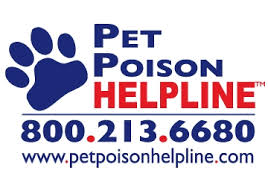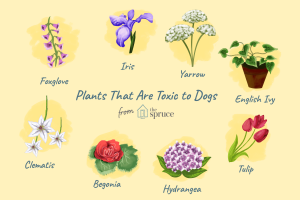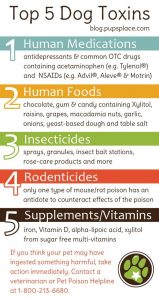

From Move Your Doggie
by Judith Tait
Poison prevention for our pets is something we do not often think about, but we should. It is important to know what to do if your pet has ingested something poisonous. It also helps to be really in tune with your pet’s behaviour so that you know what your pet is like healthy compared to what your pet would look like when he/she is feeling lethargic or acting unusual. Hopefully this situation never happens, but here are some helpful tips should your pet be exposed to poison.
If you suspect your pet has ingested something toxic, whether it be food that is not fit for animals, medication, or some poisonous plants, remove your pet from the area and check that they are breathing and acting normally. Do not panic as this will only make the situation worse and you do not want your pet to run away and hide in fear. Your pets can easily sense when you are frightened and will often react to this in a negative manner. Unless you are instructed to do so by your vet or the poison helpline, do not induce vomiting or try and administer a home remedy. The Ontario SPCA urges owners to contact their local veterinarian or veterinary clinic, or the American SPCA’s poison control hotline at 1(888)426-4435 (fees may apply), to determine if the substance your pet ingested is harmful. Not all exposure situations mean your pet needs to be seen by a veterinarian (SOURCE: Ontario SPCA).
Some common signs of exposure include, but are not limited to: difficulty breathing, seizures, or losing consciousness. These signs constitute a medical emergency. Get your pet to the vet immediately!
In order to prevent accidental poisoning it is also important to protect your pet both inside and outside the home. Check that the plants you keep are not toxic as some animals have the tendency to eat plants in order to help their digestion. Never feed your pet human food as many things that taste great to us, such as avocados, onions, dark chocolate, and alcohol, are actually toxic to our pets. Dogs can sometimes be the best vacuum cleaner for the bits of food we drop on the floor during dinner, but it is best to train your dog to ignore any food items he may be tempted to scoop up from the floor. It is extremely important to pay attention to what your dog is sniffing, licking or trying to eat while walking him/her.
Finally make sure to store any toxic household items in a safe place that cannot be accessed by your pets. Typical household items include, but are not limited to:
- Prescription and over the counter medications
- Insecticides and insect control products
- Certain household plants
- Chemical baits for mice and other small rodents
- Cleaning products such as disinfectants, bleaches and detergents
You can be assured that when dog walking or pet sitting your pets Move Your Doggie staff will always be cautious and ensure the safety of your pets while in our care.

Top 10 Dog Poisons
Each year, there are more than 100,000 cases of pet poisoning in the U.S. Many of these were caused by household substances that may seem perfectly harmless to you. But just because something is safe for people doesn’t mean it won’t hurt beloved pets. Some of the most dangerous dog poisons are foods and medications we take on a daily basis.
Depending on how a particular substance affects your dog’s body and how much was ingested or inhaled, pet poisoning symptoms can include gastrointestinal and neurological problems, cardiac and respiratory distress, coma, and even death.
Top 10 Dog Poisons
Dog poison No. 1: Prescription medications for people. Drugs that might be beneficial or even lifesaving for people can have the opposite effect in pets. And it doesn’t always take a large dose to do major damage.
Some of the most common and harmful medications that poison dogs include:
- Prescription anti-inflammatory and pain medications can cause stomach and intestinal ulcers or kidney failure.
- Antidepressants can cause vomiting and, in more serious instances, serotonin syndrome — a dangerous condition that raises temperature, heart rate, and blood pressure, and may cause seizures.
- Blood pressure medications.
- Dog poison No. 2: Insecticides.
- Flea and tick products. You may think you’re doing your dog a favor when you apply products marketed to fight fleas and ticks, but thousands of animals are unintentionally poisoned by these products every year. Problems can occur if dogs accidentally ingest these products or if small dogs receive excessive amounts. Talk to your vet about safe OTC products.
- Dog poison No. 3: Over-the-counter medications. This group contains acetaminophen (Tylenol), ibuprofen and naproxen (Advil, Alleve), as well as herbal and nutraceutical products (fish oil, joint supplements).
- Dog poison No. 4: Pet medications. Just as we can be sickened or killed by medications intended to help us, cases of pet poisoning by veterinary drugs are not uncommon. Some of the more commonly reported problem medications include painkillers and de-wormers.
- Dog poison No. 5: Household products, from cleaners to fire logs. Just as cleaners like bleach can poison people, they are also a leading cause of pet poisoning, resulting in stomach and respiratory tract problems. Not surprisingly, chemicals contained in antifreeze, paint thinner, and chemicals for pools also can act as dog poison. The pet poisoning symptoms they may produce include stomach upset, depression, chemical burns, renal failure and death.
Dog poison No. 6: People food. Your canine companion may look so cute as he sits there begging for a bite of your chocolate cake or a chip covered in guacamole, but not giving him what he wants could save his life. Animals have different metabolisms than people. Some foods, such as onions and garlic, as well as beverages that are perfectly safe for people can be dangerous, and sometimes fatal, for dogs.
- Chocolate . Though not harmful to people, chocolate products contain substances called methylxanthines that can cause vomiting in small doses, and death if ingested in larger quantities. Darker chocolate contains more of these dangerous substances than do white or milk chocolate. The amount of chocolate that could result in death depends on the type of chocolate and the size of the dog. For smaller breeds, just half an ounce of baking chocolate can be fatal, while a larger dog might survive eating 4 ounces to 8 ounces, though 8 ounces would be extremely dagerous. Coffee and caffeine have similarly dangerous chemicals.
- Alcohol. Symptoms of alcohol poisoning in animals are similar to those in people, and may include vomiting, breathing problems, coma and, in severe cases, death.
- Avocado. You might think of them as healthy, but avocados have a substance called persin that can act as a dog poison, causing vomiting and diarrhea or worse.
- Macadamia nuts. Dogs may suffer from a series of symptoms, including weakness, overheating, and vomiting, after consumption of macadamia nuts.
- Grapes and raisins. Experts aren’t sure why, but these fruits can induce kidney failure in dogs. Even a small number may cause problems in some dogs.
- Xylitol. This sweetener is found in many products, including sugar-free gum and candy. It causes a rapid drop in blood sugar, resulting in weakness and seizures. Liver failure also has been reported in some dogs.
Dog poison No. 8: Plants. They may be pretty, but plants aren’t necessarily pet friendly. Some of the more toxic plants to dogs include:
- Azaleas and rhododendrons. These pretty flowering plants contain toxins that may cause vomiting, diarrhea, coma, and potentially even death.
- Tulips and daffodils. The bulbs of these plants may cause serious stomach problems, difficulty breathing, and increased heart rate.
- Sago palms. Eating just a few seeds may be enough to cause vomiting, seizures, and liver failure.
Dog poison No. 9: Rodenticides, if ingested by dogs, can cause severe problems. The symptoms depend on the nature of the poison, and signs may not start for several days after consumption. In some instances, the dog may have eaten the poisoned rodent, and not been directly exposed to the toxin.
Dog poison No. 10: Lawn and garden products. Products for your lawn and garden may be poisonous to pets that ingest them.
What to do for suspected dog poisoning
If you think your dog has been poisoned, try to stay calm. It is important to act quickly, but rationally.
First, gather up any of the potential poison that remains — this may be helpful to your veterinarian and any outside experts who assist with the case. If your dog has vomited, collect the sample in case your veterinarian needs to see it.
Then, try to keep your pet calm and call your veterinarian or the ASPCA Animal Poison Control Center (APCC) at (888) 426-4435. Experts at the APCC are available to answer questions and provide guidance 24 hours a day for a $60 consultation fee. Another option is the Pet Poison Hotline with a fee of $59 per incident.
Poison Protection: Pet-Proofing Your House
The best way to reduce the chances that your dog will be the victim of pet poisoning is by preventing exposure to dangerous substances. Here are a few suggestions:
- Keep all medications, even those in child-proof bottles, in cabinets that are inaccessible to your dog. If you inadvertently drop a pill on the floor, be sure to look for it immediately. Supervise anyone, such as the elderly, who may need help taking medications.
- Always follow guidelines on flea or tick products.
- Although you can safely give some ”people foods” to your pet as a treat, others are toxic. If you have any questions about what is safe, ask your veterinarian. Or, err on the safe side and give treats made specifically for animals.
- Be sure any rodenticides you use are kept in metal cabinets or high on shelves where your pets can’t find them. Remember that dogs can be fatally poisoned by eating an exposed rodent, so always be very cautious about using these products. Tell your neighbors if you put out rat bait, so they can protect their pets from exposure, and ask them to do the same for you.
- When buying plants for your home, opt for those that won’t cause problems if your dog happens to nibble on them. The ASPCA has an online list of toxic and nontoxic plants by species. If you choose to have toxic plants, be sure they are kept in a place where your animals can’t reach them.
- Store all chemicals and cleaners in pet-inaccessible areas of your home.
Plants poisonous to dogs:
ASPCA https://www.aspca.org/pet-care/animal-poison-control/toxic-and-non-toxic-plants
Pet MD https://www.petmd.com/dog/slideshows/emergency/poisonous-plants-to-dogs
Common Backyard Plants that are poisonous to dogs THE SPRUCE https://www.thespruce.com/plants-poisonous-to-dogs-2132451
Poisonous House Plants Balcony Garden Web https://balconygardenweb.com/poisonous-houseplants-for-dogs-plants-toxic-to-dogs/
Toxic plants common in flower arrangements 1st In Flowers https://www.1stinflowers.com/articles/poisonous-plants-for-dogs.html
Poisonous Plants Dog Health Guide https://www.dog-health-guide.org/dogpoisonousplants.html
Foods Toxic To Dogs:
Foods your dog should never eat Web MD https://pets.webmd.com/dogs/ss/slideshow-foods-your-dog-should-never-eat
People foods to avoid feeding your pets ASPCA https://www.aspca.org/pet-care/animal-poison-control/people-foods-avoid-feeding-your-pets
Foods Toxic to Dogs Canine Journal https://www.caninejournal.com/foods-not-to-feed-dog/
13 foods that are dangerous to dogs Vets Now https://www.vets-now.com/2017/01/foods-poisonous-to-dogs/









